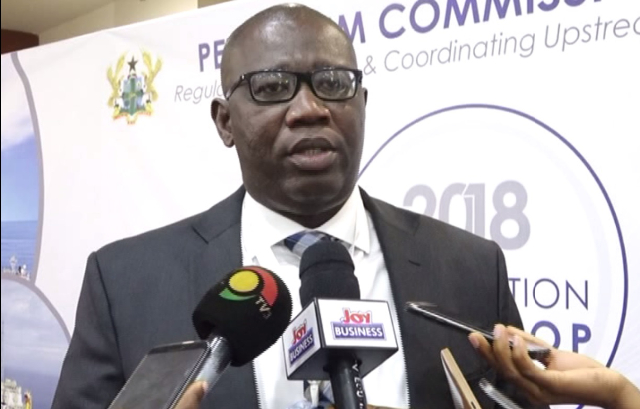…As Ghana warns against fronting in oil and gas industry
Having steered the affairs of leading indigenous oil and gas giant, Seplat Petroleum Development Company, for a successful decade and ready to exit July next year, the notice that outgoing Managing Director/Chief Executive Officer, Austin Avuru, would be replaced by a Briton has raised issues of contraventions on local content laws.
This is coming at a time the Ghanaian Petroleum Commission says Ghana needs an indigenous pool of experienced and highly skilled upstream service companies willing to prioritise, adapt and compete prudently in the oil and gas industry than using fronts veiled by expatriates.
Ghana Business Hilights Bureau Chief reports that the development has therefore made the Commission to start working together with other state actors including; the Registrar General’s Department and the Ghana Revenue Authority to begin the enforcement of the relevant laws.
The Chief Executive Officer of the Commission, Mr. Egbert Faibille Junior, who spoke at the recent 2019 Local Content Conference and Exhibition, organised by the Petroleum Commission in Accra, advised all those engaged in fronting to put a stop to it immediately.
The theme for this year’s Conference is: “Maximising In-Country Value Addition; the Role of Indigenous Ghanaian Companies (IGCs) and Joint Ventures (JVs) in the Upstream Petroleum Sector”.
It was gathered that the Local Content Conference and Exhibition has grown to become the largest gathering of industry executives, finance, investment and insurance professionals, academia, International experts and relevant stakeholders in Ghana.

On the Seplat Petroleum matter, Nigerian industry experts have argued that any plot to replace the outgoing CEO, Mr Avuru, with a Briton negates Section 30-36 of the Nigerian Oil and Gas Industry Content Development Act and defeats the country’s Local Content (LC) policy.
SEPLAT came into existence in June 2009 through the partnership of Shebah Petroleum Development Company Limited and Platform Petroleum Joint Ventures Limited, specifically pursue upstream oil and gas opportunities in Nigeria, and in particular divestment opportunities arising out of the incumbent Major IOC’s portfolios.
Avuru, the pioneer MD/CEO of Seplat, is set to retire in July 2020 after leading the oil firm for 10 years. Following the development is a corporate disclosure at the Nigerian Stock Exchange (NSE) that Roger Brown, the firm’s Chief Financial Officer/Executive Director and a Briton, will succeed Avuru next year.
Pundits say apart from Avuru’s 10 years stay at the company, his 38 years wealth of industry expertise and experience, must have been impacted on so many qualified Nigerians in the company to be fit in assuming the position of the chief executive.
Besides, the NCDMB Act made it clear that “at the point where no Nigerian is fit to lead in the position for lack of training, the board should ensure effort is made with reasonable time for a Nigerian to be trained.”
Experts are of the view that there is no way Avuru, having spent several years in the company, will not have groomed a Nigerian replacement having been aware of the provisions of the Local Content Act.
Certainly, Avuru has clearly positioned Seplat to provide a sustainable solution for the LPG shortages in the country with recent mileages covered by the indigenous firm which many fear that cannot be entrusted to foreigners with no long term view.
Seplat had the potential to support further local capacity expansion projects with the forthcoming Assa North-Ohaji South Project (ANOH), one of the largest greenfield gas condensate development projects being undertaken in Nigeria.
It involves the development of the Ohaji South gas and condensate field located within the licence block OML 53 and the Assa North field in license block OML 21. The project has significant gas supply for the local grid. The phase one development of ANOH midstream is expected to cost $700 million, of which the JV of Seplat and NGC will fund $420 million.
 In his remarks on the matter, Avuru averred that “Having a foreigner taking over from an indigene tend to is a set back of the growth of real income per capita and job creation in Nigeria which give the opportunity to reverse the population decrease trend.
In his remarks on the matter, Avuru averred that “Having a foreigner taking over from an indigene tend to is a set back of the growth of real income per capita and job creation in Nigeria which give the opportunity to reverse the population decrease trend.
“Amidst some pitfalls and risks accompanying the appointment of Brown, the transition if allowed to stand is significantly a setback for the gains of the local content program and rubbish all the progress maxed over the past five years.
“The LC policy since its establishment has played a key role in the advancement of the Nigerian Oil and Gas Industry, giving first consideration to Nigerian independent operators, creating a platform for the Nigerian firms to contribute immensely towards the growth of the Nigerian economy. The move in Seplat, giving out direct opportunities for employment to foreign nationals, shows a neglect of developing local skills and use of local manpower, he averred.
There are strong indications that the succession plan may be restructured in observance of extant local content provisions.









